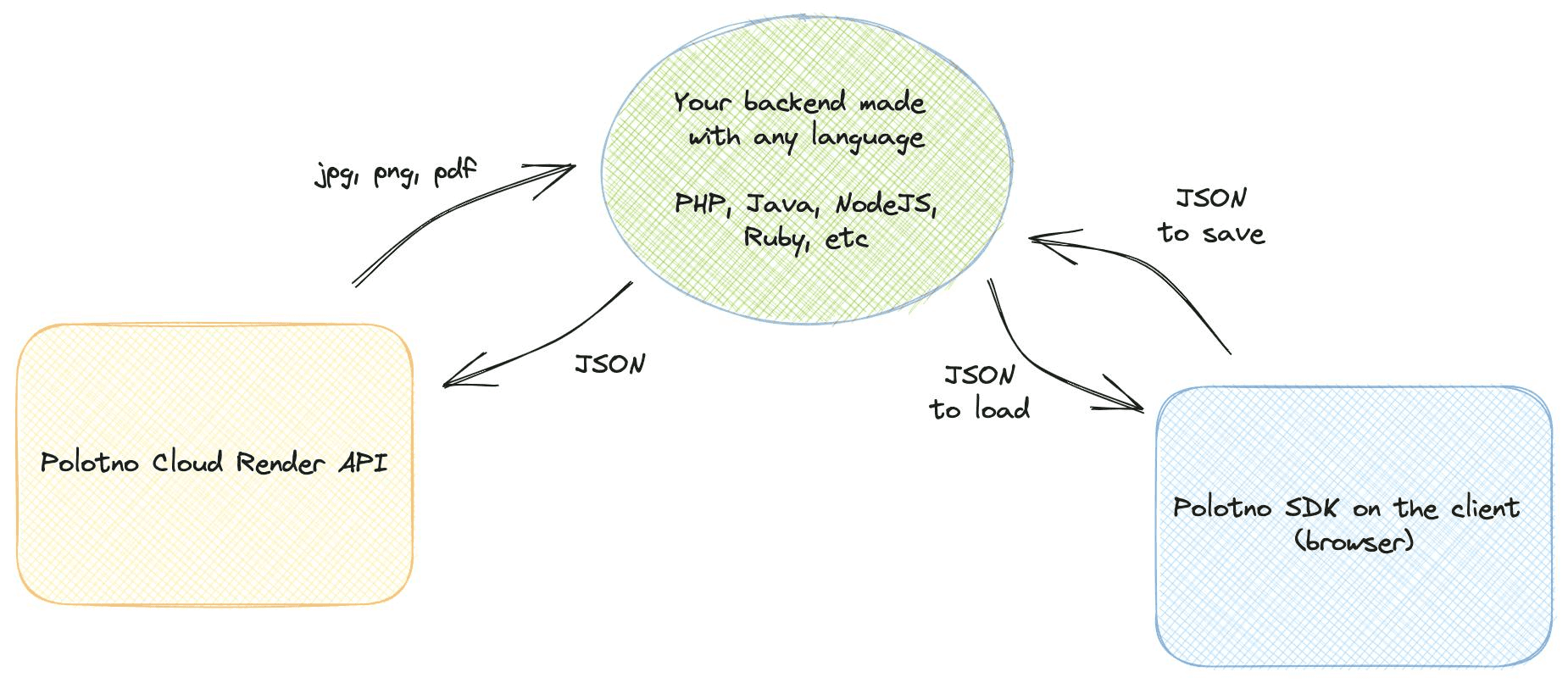What is Cloud Render API?
Using Polotno SDK, you can generate images directly on the client. But sometimes you need to generate images on the backend. For example, if you want to generate a 1,000 images with different text on it or if you want to simply offload rendering work from the client.
Polotno Cloud Render API allows you to generate images on the cloud without any backend infrastructure. You can use it to generate images on the fly or to generate images in bulk.

Pricing
Cloud Render API is available for any subscribers. For more information, please take a look into pricing. If you have any questions, write as.
Before you start
(!) Important: all finished jobs will expire in 1 week. Such jobs will be deleted from the database and all render artifacts (images, PDF, videos, etc) are removed from File Storage. Make sure to download the export result. If you need a persistent file store, please write us.
What does it look like?
1. Create render job
You can send a POST request to the cloud render API to schedule a rendering job.
It will return a JSON in format like this:
Check render job status:
Options
design : json, required - data from polotno export store.toJSON(). Remember that you can generate such JSON on the fly from your backend (e.g. replace text on some elements dynamically).
format : string - file format of generated result. Possible values are: png (default), jpeg, pdf, gif and mp4
webhook : string - parameter specifies the URL path to receive HTTP POST notifications about the render job's status updates and completion.
pixelRatio : number - quality modifier of export. 0.5 value will reduce both width and height by 2. Values larger than 1 will increase quality (and file size).
ignoreBackground : boolean - should we remove page background on export? Default is false
includeBleed : boolean - should we render bleed areas in the export? Default is false
htmlTextRenderEnabled : boolean - enable Rich Text Feature to render HTML strings in text elements. Default is false
textVerticalResizeEnabled : boolean - enable Vertically Resized Text. The default is false.
skipFontError : boolean - continue render process is a font loading is failed. The default is false.
skipImageError : boolean - continue render process is an image loading is failed. The default is false.
textOverflow : string - overwrite overflow logic of text elements. The default is change-font-size. Other possible values are resize and ellipsis
vector : boolean - make pdf in vector format (with selectable text). This feature is in the alpha stage! Default is false.
See a list of created jobs
Synchronous request
You can use Prefer: 'wait' header if you are doing a quick render, such as an image. Such a synchronous request will not return a scheduled job immediately and instead wait for its complete and then return job data. The request may still return an unfinished job if rendering takes too long time, for example if you send a long video to a render.
Legacy API Documentation (Ongoing Support)
When you send request to the API, you need to pass JSON into request's body.
design
design - JSON data from polotno export store.toJSON(). Remember that you can generate such JSON on the fly from your backend (e.g. replace text on some elements dynamically).
outputFormat
outputFormat - defines response format. Possible values are: dataURL (default), url and file.
If you use dataURL or url, API will return json { url: '...' } where url is the generated image url.
file format will return file buffer. You can save it directly on the backend.
⚠️ Important
Cloud API has 5mb limit for its payload!. So it will be not able to return large data in dataURL or file format. You can use url format instead.
Images generated using url format expire in 24 hours. After that time, access to the files is not guaranteed.
You will have to set up the infrastructure for storing files to guarantee the access.
format
File format of generated result. Possible values are: png (default), jpeg, pdf.
exportOptions
Options that will be passed into polotno-node export function.